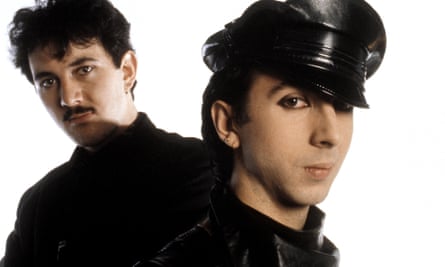In the late 1660s, after the Great Fire, building began on land then known to Londoners as Henry VIII’s Royal Park. It used to be fields around there, save for a few cottages. The area was primed to be one of London’s grandest neighbourhoods, one of its future Marylebones or Mayfairs. A few decades later, the Huguenots arrived and built a church. Italians, Greeks and Algerians followed, setting up small businesses, cafes and restaurants. Then came the small theatres and the music halls, the poets and the performers, the prostitutes and the pop stars.
“Soho was this mythical place where anything went on, that collected outsiders, full of people that didn’t really fit in anywhere else.” On a muggy autumn afternoon at the private members’ club Soho House, Marc Almond, here to discuss his new 10-album career retrospective box set, is describing the place that made him who he was in the late 20th century. “A friend of mine, a ballet dancer, lived here in the late 70s, opposite a casino, and there were neons in the windows and the police coming every night arresting people. And I thought: this is where I want to be. This is where I’m meant to be.”
But what Almond really loved about Soho went a little deeper. “The love of history next to the glass buildings, the little music hall next to the apartment block.” He smiles, a little sadly. “The old and the new.” It was here, on Brewer Street, that the kohl-eyed creature in front of me bought his first London flat 35 years ago, after having his first No 1 single as half of the duo Soft Cell. A fabulous update of a northern soul staple through the medium of synth-pop, Tainted Love had a grittiness and a grottiness about it; it was waywardly glamorous. At its heart was that voice – deep, menacing, glorious, slightly out of tune, and unmistakably English.
It’s the song Almond is best known for, a little to his chagrin, but it speaks volumes about his career, documented in the fabulously titled box set Trials of Eyeliner. Ten CDs is a lot, but its vastness stands up, telling us the tale of a musician who has never stood still. Cassette-only experiments with industrial group Coil sit next to lush smash hits, including Something’s Gotten Hold of My Heart, Almond’s duet with its original singer Gene Pitney (the pull of which was so strong in January 1989 that it knocked Kylie Minogue and Jason Donovan’s Especially For You off the top of the charts, and stayed there for a month). Operatic song cycles for the stage sit alongside singles about rent boys (1985’s Stories of Johnny was performed live on Wogan with a children’s choir). Other collaborators include Nico (Almond recorded Your Kisses Burn with her shortly before she died in 1988; a picture exists of the two of them playing pool), house DJ T-Total and Saint Etienne’s Sarah Cracknell.
Almond arrives shyly today with his young female PA, not wanting to be in the hubbub of noise surrounding London Fashion Week, which is circling upstairs. He’s not one for phone interviews, which he says make him nervous; he prefers Skype, or speaking face to face. He is good at it too, warm and funny despite obvious anxiety; and his perfectly made-up face looks far from that of a man who will turn 60 next summer.
Looking back at his career, however, he is wary of nostalgia. “It’s a great comfort blanket sometimes, as long as you don’t become totally nostalgic about everything… being that old person sitting there saying: ‘Oh, it was better in this day and that day, now it’s no good any more.’” Still, he has inevitably been taken back to his roots with this project, to the young boy from the north-west who went to Leeds Polytechnic to study art, but spent all his holidays in London, working on experimental theatre pieces about the city. “I felt I could disappear here, or appear or disappear, however I wanted to be.”
Almond’s story, like those of many artists who became famous in the 70s and 80s, follows a familiar pattern. Difficult childhood, pseudo-spiritual conversion through pop music, fully funded creative years at university, giro cheques and crap jobs, managers taking a risk – and ta-dah! No 1. “Back then, record companies [were run by] mavericks. When you had a flop record, you weren’t just put in the dumpster. You were nurtured, and allowed to make another record and another record because people believed in you. Now people are allowed one successful album, then [if the next fails] they’re gone.”
Born Peter Mark Sinclair Almond in 1957 to a Scottish father and a Norwegian mother, he was brought up, on and off, by his maternal grandparents in Southport. His father, a soldier, told his son he had been a mistake and once tried to suffocate him with a pillow; his mother frequently laid a hand on him (when his parents divorced when he was 15, he and his younger sister, Julia, were “delighted”). Almond was often ill with asthma and bronchitis and had issues at school arising from (he now understands) dyslexia and mild autism. But he has fond childhood memories too – of his grandfather carrying him on his shoulders on Southport beach, singing Stranger in Paradise from the Broadway musical Kismet. His grandmother, too, was a positive influence. “She always had her hairstyle like the Queen’s, and she taught us to speak properly.” Almond’s soft vowels are testament to her. “I still don’t know what kind of shock she had seeing me on Top of the Pops, though,” he laughs.
Almond’s obsession with music began around the same time he realised he liked boys. Deep Purple and Black Sabbath were his passions at 13, before glam rock glittered into his life as his adolescence surged. He is Marc because of Bolan, and wears a purple and gold T Rex T-shirt under his jacket today; he also adored Bowie, seeing him on his Ziggy Stardust and Aladdin Sane tours. “He was so much more important to me than my teachers. He got me into books, music, films – that’s what great pop stars can do.” Then came punk, he continues, enthusiastically. “And Soft Cell came from punk. Punk made me realise that I didn’t need to be brilliant at playing instruments or making art – I could just create. It was about free expression.”
For Almond, this manifested itself in performance pieces he’d do while studying art at Leeds Polytechnic. Take one called Icebox, in which he would sit at a mirror, naked except for black boots and a strategically placed swastika, shaving his hair then cutting himself, and simulating sex. Rather less dramatically, he became friends with a “tall, stocky bloke from Blackpool who liked painting” – one Dave Ball, who would mess around at the art department’s tiny music studio on a Korg synthesiser. Serendipitously, Ball needed a singer to give shape to the spines of some songs, and Soft Cell’s stark, gothic first track, The Girl with the Patent Leather Face was recorded in the art department studio. Still startling today, it shows how cheap machines could help musicians with little money make gripping music, as did the duo’s next track, Memorabilia, which sounds like cutting-edge techno long before it was officially invented.

By summer 1981, Soft Cell had a record deal. Itching to be different from all the other icy synth-poppers, they decided to cover Tainted Love, which became 1981’s biggest single (1.27m copies sold to date, though Almond didn’t make a penny from the sales as the B-side was also a cover). He seems particularly pleased, nevertheless, that it kept Shakin’ Stevens’s Green Door off the No 1 spot. “I don’t think Shaky was very happy with me about that.”
Almond’s obvious otherness was intriguing to many, but threatening to others, including his publicists, who weren’t happy with how outre he was. They invented relationships he’d had with women (including Liv Tyler’s mother, Bebe Buell) to sell to the papers, and kept asking Almond to tone his outfits down, but he point-blank refused. “If I didn’t, Soft Cell would be finished, I kept getting told.” Watch Soft Cell playing Bedsitter on Top of the Pops four months later, you see how Almond reacted: he’s a riot of S&M-friendly black leather. Two weeks later, their debut album Non-Stop Erotic Cabaret came out. It featured songs called Seedy Films and Sex Dwarf.
Being a gay artist back then was tough, Almond says, and although things are better now, they’re not as good as they should be. “The less mainstream press are a lot more accepting, but in other areas there’s still a tendency to accept the gay stereotype – I call it the gay clown – who’s prepared to do a gay performance for straight people, and that bothers me.” He rails at The X Factor’s treatment of gay contestants particularly. “There’s this homophobic side to it – they pick a gay person who’s going to be super-super-camp. What they’re saying is ‘Let’s just have a bit of a laugh at them’, really.” He is visibly riled. “I would never have got through these auditions. I’d be one of the quirky ones they’d stick in as a novelty act.”
The “acceptable face of gayness” in general culture gets him bristling too. “You’ve got to be good looking, chiselled, have a bit of Botox, and wear a designer outfit to be accepted – and you’ve got to be married, preferably. Where does the loner outsider in Castleford fit into all that? In the north, camp is still a weapon and a survival mechanism, but it’s still derided. At least the gay community was more unified back then. Parts of the gay community are not valued as much as other parts in 2016… It’s very divided these days.”
As the 80s wound on, Almond’s career went leftfield. An offshoot project, Marc and the Mambas, mixed chanson, vaudeville and goth, while Soft Cell committed “commercial suicide” with 1983’s The Art of Falling Apart and 1984’s This Last Night in Sodom. Almond loved it. “Instead of posing in party hats on the front of Smash Hits, we were being written about in serious music papers, which was great.” Then they split up; not acrimoniously, but because Ball didn’t want to tour and Almond did (they re-formed for a while at the turn of the century, and still remain friends).
Almond also became friends with Nick Cave around then, and both were part of the Immaculate Consumptive, a one-off collective led by Lydia Lunch, which played just three gigs, in October 1983. Drugs were everywhere. “It was a cabaret show of the lost and the miserable. It was a great, wild time.” Almond has been “in awe” of Cave as an artist ever since, but they’ve long drifted apart. “He once sent me a book, quite a lot of years ago now, inscribed with the words, ‘From your long-lost friend’, and I didn’t do anything about it. And I sometimes see him at awards ceremonies, but I’m actually too shy to speak to him.”
The 1990s brought more success, including a fabulous No 4 cover of David McWilliams’s The Days of Pearly Spencer. But drugs had taken their toll, and he gave them up completely by the late 1990s, save for a final binge on Millennium Eve. “I felt it was an end of days, just like Prince said – you’ve got to party like it’s 1999 – so I started the millennium just how I didn’t want it to start.” His grandmother also died very early in 2000, aged 96, and he started thinking about her influence again. “She knew more about music than me in her old age – she was in a nursing home losing her sight, listening to the radio, talking about the songs with the young girls who looked after her. She’d seen through the millennium, she’d seen the fireworks on the TV, she’d lived the 20th century.” He still misses her. “But I don’t want to live as long as my grandmother. And I don’t think I will.”
In 2004, Almond had his closest brush with death yet. A car went into the motorbike on which he was riding pillion, throwing him into the road; he suffered serious head injuries, had part of his skull removed, and took a few years to recover (his first performance back was in 2006 with Antony Hegarty, his head still shaved). His short-term memory is still affected, and a stammer he had as a child returned for a while. But he refuses to talk about the experience negatively. “I found I wanted to take lots of opportunities, and have experience and adventure again. After an accident you think, what in reality is left in my life? I mean, without being very morbid, I’m 60 next year – how much longer am I going to live? And how am I going to use that time really, really well?”
In the past nine years, Almond has released nine albums. They include collaborations with Current 93, composer John Harle, and a song Jarvis Cocker wrote for him called Worship Me Now (in Pulp’s seedy stories, you see Soft Cell recast in bright indie-pop colours). Almond has also thrown himself into Russian culture, covering the songs of singer Vadim Kozin on 2009’s Orpheus In Exile. He finds the country’s gay culture particularly fascinating. “I have gay friends in Moscow who see things from a very different point of view than the west. They kind of want to have this dictator... this person that tells them what to do. They all pay corrupt people under the table… there is that life there. I guess when you have this place that’s absolutely a gigantic collection of gangster states, it takes a monster to look after the monsters.”
He’s also on the fence about Brexit. “I felt worried at first. I’ve always been a bit of a European person. Then I kind of thought, what is, is. All I can think is that fighting about it is hopeless. We have to go forward and make something work, because it’s not going to change.” Still, he does have his anxieties. “The world is a very unsteady, strange, odd place at the moment. I have lots of anxiety and lots of worry about it. I try not to watch the news and then I get obsessed about it. You watch every day, in horror of something else [happening], and then you think the rise of the right in Europe – I just think, thank God I’m getting on. I’ll be ‘come, sweet death’ when it comes!”
In recent years, though, he’s tried to fight age. He has tried to get into newer music – he likes the new Wild Beasts record especially – but has also embraced nostalgia with heart. He’s sung with official T Rex tribute band T-Rextasy (his version of Teenage Dream is on the box set) and toured with Holy Holy, the band formed by Tony Visconti and Bowie’s old drummer Mick “Woody” Woodmansey, performing The Man Who Sold the World. Visconti would often peel away from practice to take phone calls, Almond remembers – this was 2015. “‘Who the bloody hell is this now?’, he’d say, then he’d go, ‘Oh, David! Hello David.’ You kind of got this sense that something was not quite right.” Almond also went round the Bowie V&A exhibition with Visconti, seeing him “wandering around, looking at a synthesiser, going, ‘I remember that from the studio floor.’ All these one-armed, one-legged costumes I’d seen when I stood at the front of the stage for Ziggy Stardust, and there they were, on a lifeless mannequin…” Almond didn’t like the experience. “It already felt like David Bowie had died.”
Almond has been a regular on the somewhat cheesy Rewind 80s revival tours, which might feel like a strange fit for someone so wilfully wayward – but he’s loved them. They’ve given him a refreshing perspective on the early days of his fame. “Back then, you’d be in London for Top of the Pops at the Columbia hotel, opposite the Human League at breakfast, with Siouxsie and the Banshees at the bar. We were all encouraged to have this rivalry, so you’d end up being quite bitchy about, I don’t know, Spandau Ballet. But now doing tours with Tony Hadley…” His enthusiasm is obviously sweetly genuine. “Tony Hadley! I love the way he just turns up in bright, hot sunshine to do a gig in a blazer and a tie.”
Almond’s done his last Rewind tour, though, he says. “I caught sight of myself on the TV screen last year, and thought, ‘Oh dear, I’m not sure how much longer I can do this.’” Still, the feeling of playing songs such as Say Hello, Wave Goodbye is hard to resist, he admits, watching 30,000 people singing along, waving inflatable pink flamingos in honour of the nightclub he mentions in the lyrics. It remains one of the great ’80s pop ballads, with its harsh drums and brash synthesiser line beating in the agonies, over a glorious, melancholic melody and those unmistakably English lyrics: “We tried to make it work/You in a cocktail skirt/And me in a suit/But it just wasn’t me”. A story about the breakdown of a relationship between a boy and girl “used to wearing less…under a deep red light”, he feels privileged to have written it, he says. He did so in a student bedsit in Leeds, trying to do his own version of a chanson, dreaming of prostitutes and pop stars, dreaming of Soho.
In 2016, Marc Almond has fallen out of love with the place that made him who he was – a place that has tried to be aspirational in its own chaotic, characterful, individual way for the past 450 years. It’s a long time since he lived in Soho – he’s now in South Bermondsey, where he’s currently battling noisy neighbours – but still regularly comes into the West End. He still sings about London, and in 2014 even released two albums about it: The Tyburn Tree (Dark London) with composer, John Harle, and a live recording of Ten Plagues, about London after the Great Fire, written by Mark Ravenhill. London’s present is what bothers him.
We talk about Madame Jojos and the Vintage Magazine Company shutting on Brewer Street, the road about which he wrote the song Brewer Street Blues in 2010, included in the new box set. “A monoculture has come to our society now, where every city and every place is the same. You’re not even given a chance to be anti-establishment any more. You have to be establishment right from the word go to be accepted.” It was a “great love affair”, him and London, he goes on, his eyes a little downcast. “But at the end, we’ve started to bicker. And then the bickering overcame the laughs, and it just became bickering, and then I suddenly felt – I never thought I would say this – I don’t think I can take this any more.”
As he gets older, he also thinks more of where he comes from, and even thinks he might return to Southport, which he wrote about beautifully on the title track of his most recent album, 2015’s The Velvet Trail. In it, he wanders old arcades where teenage dreams are won and lost, and summer leaves without saying goodbye. “It’s a song about where you go back to at the end of your life, and Southport is such an inspiring place to me. I still feel it was a bit part of my makeup as a child, the loneliness of seaside towns, and the sea out of season.” He smiles, ruefully. “There’s nothing so sad as the sea out of season.”
But Almond’s not finished with music just yet. He’s recently signed to a major label for the first time since 1999 and a new record is planned for next year. The approach from Universal about this box set also gave him fresh energy. He finds the renewed interest surprising and exciting.
He also knows that if he had his time again, he’d take mainstream success every time. “When someone fringe like me is given a chance, is given 35 years in the mainstream, it’s a great chance to be subversive, to get other ideas and other things across to people. I’ll never forget that.” Almond sounds a little sad as he speaks, but there’s hope around the edges of his words. “I’m someone who likes taking the past with me, really. And I keep going forward, looking forward, moving forward.”
Trials of Eyeliner (Universal) is released on Friday. Marc Almond performs at at the RNCM theatre, Manchester on 20 December
This article was amended on 23 October 2016 to correct the title of Soft Cell’s debut album






Comments (…)
Sign in or create your Guardian account to join the discussion